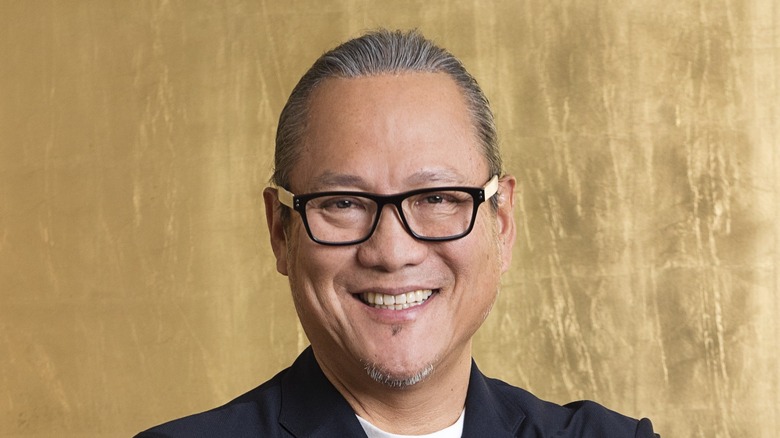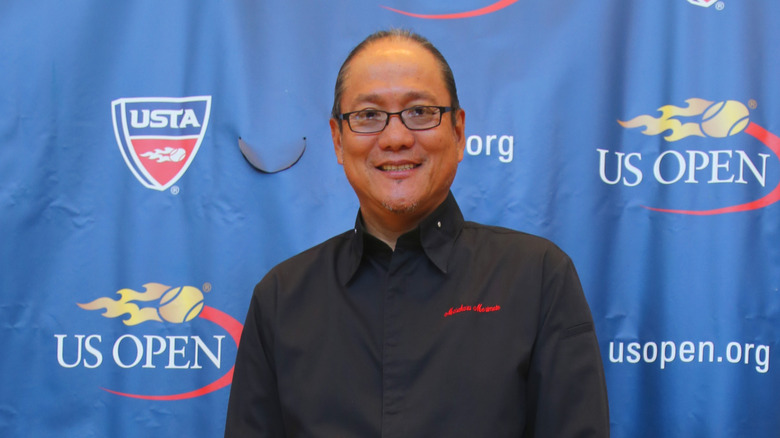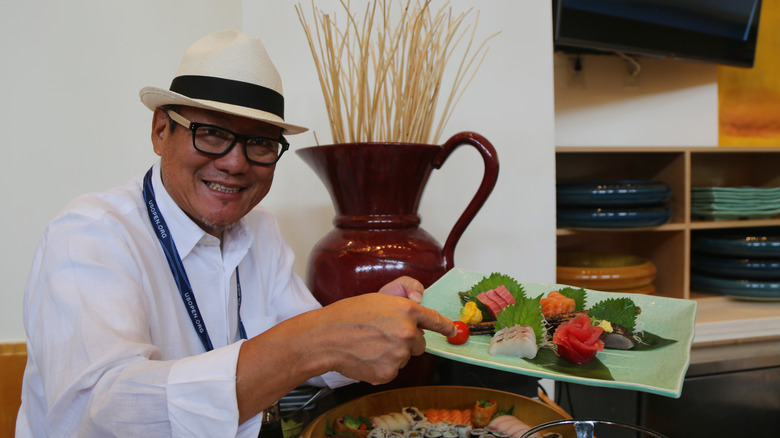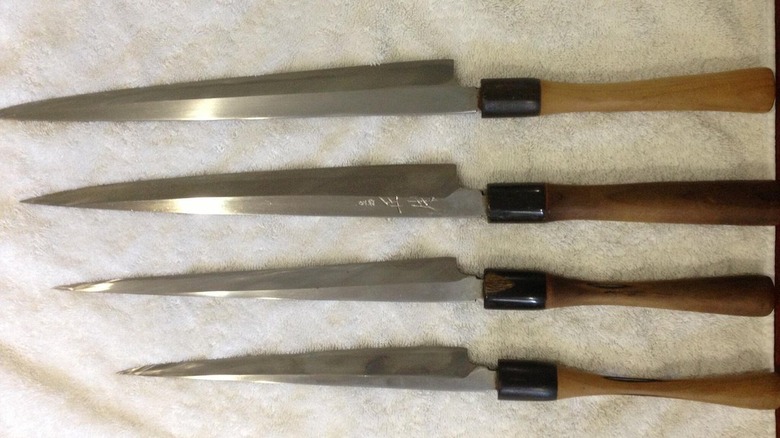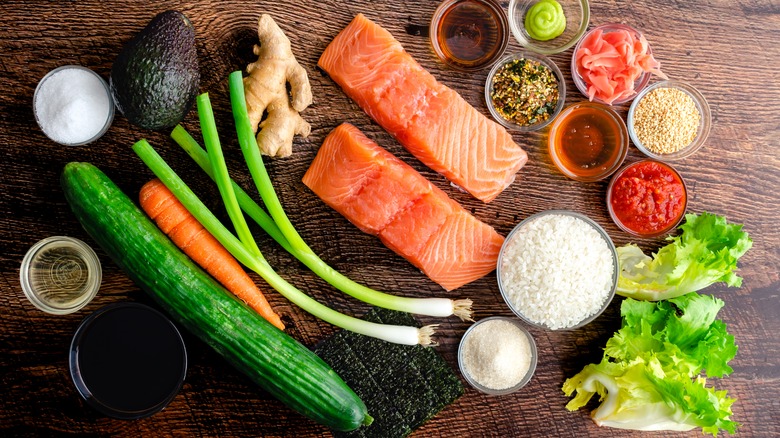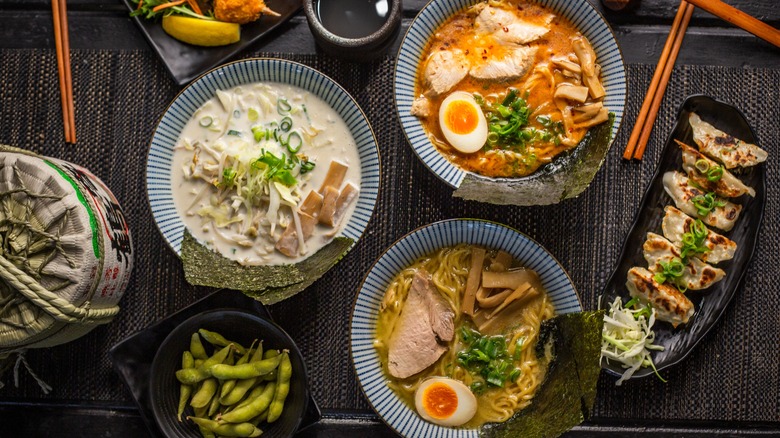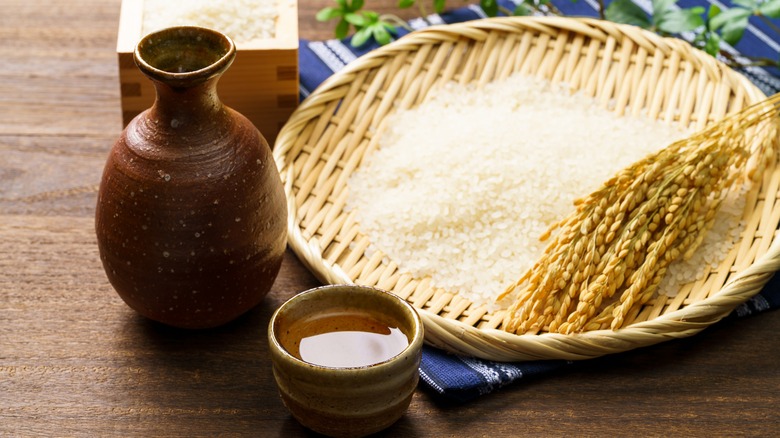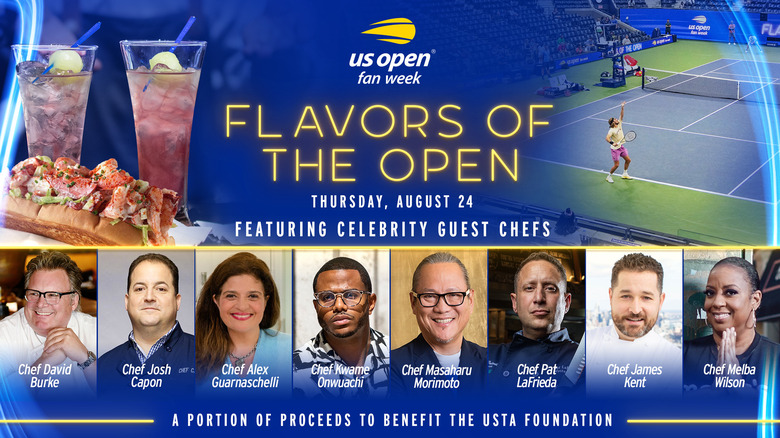Chef Morimoto's Passion For Sports And The Secret To Balancing Flavor
The US Open brings together international tennis stars to compete in a fantastic display of agility and skill. In the spirit of getting the best of the best, this year also marks the return of Flavors of the Open. This event gathers up celebrity chefs to create delectable tastes for visitors to sample. Even better, some of the proceeds from the ticket sales benefit the USTA Foundation, which helps provide access to youth sports and education to underprivileged youth.
Among the fantastic lineup of chefs this year is Masaharu Morimoto, who has had a wide and varied career. His restaurants can be found all over the world, and he has seen how tastes in America have changed and adapted. In an exclusive interview with Mashed, Morimoto notes that "when food travels, it adapts to its local culture, customs, and ingredients." Rather than shun this evolution, Morimoto embraces it, stating, "This should not be seen as a negative thing [but] more of a way to be creative and change the tradition into something unique." This melding of cultures and traditions is exactly the practice that Flavors of the Open embraces.
The connection between food and sports
As one of the originals from TV's "Iron Chef," Masaharu Morimoto is no stranger to competition. Many don't know, though, that before his career as a chef, Morimoto was on the path to become a professional baseball player until an injury sidelined that dream. Not to be deterred, Morimoto went from baseball to his other great love, food. While his culinary career has taken the world by storm, his admiration for sports has never waned.
The mix of these two passions makes Morimoto a perfect fit for the upcoming Flavors of the Open event, where he is a regular participant. "Having attended the event for nearly 15 years, it has been my honor to meet and be able to serve Japanese cuisine to many of the guests, players, and champions," he says in the interview with Mashed. His passion for the event radiated as he expressed his excitement at having "world-class culinary" at the "greatest sporting event in the world."
Entering the world of sushi
Sushi is a notoriously tricky food to master, but it is also one that is incredibly rewarding. Novice chefs may be intimidated to make sushi, but it is essential to remember that even great sushi chefs start somewhere. Masaharu Morimoto's first cooking job was at a sushi restaurant in Japan, where he worked for seven years. Now, of course, Morimoto is a master and will be serving up sushi for the Flavors of the Open.
For those still learning about sushi, Morimoto has some advice. Quality ingredients are key to creating successful sushi. As sushi is such a challenge to make, though, don't begin with fancy fish. Instead, Morimoto says to "start small and always leave room to make mistakes." He recommends using "either a tuna or salmon roll." Even when starting out, though, do not skimp on ingredients. "When cooking sushi, always [have] good sushi-grade tuna from a high-quality fresh fish provider," he says, adding never to use cold rice as "it will take away from the flavors of the fish."
Finally, the proper instrument is essential. And when it comes to sushi, a lot rests with your choice of knives. "Always use a specialty knife," Morimoto says. A knife designed for sushi will help achieve the desired cuts in ways that a multipurpose knife simply can't. Just remember to always keep your knife properly sharpened. Morimoto recommends using a whetstone to ensure the blade cuts correctly.
The right tool for the job
With that tip in mind, it may come as no surprise that Masaharu Morimoto believes strongly in quality knives. A well-crafted knife will serve a chef well through the years. In 2018 Morimoto posted a photo on Twitter showing how his knives became worn through years of care and use. "There is so much versatility when you use a sharp, good knife," Morimoto says.
He recommends getting Japanese knives, adding, "I always say that Japanese knives are the perfect weapon for a chef." While it is easy to assume all knives are created equal, this could not be further from the truth. Knives made in different fashions each have different strengths and weaknesses, but for Morimoto, a Japanese knife cannot be beaten. "What sets it apart is it's generally more balanced in the hand, and it can hold an edge for a longer time," he says. To drive the point home, he reminds us, "This is specifically useful for cutting sushi, as it is a dish that stems from its presentation."
Key ingredients in Japanese cooking
For those just beginning their journey in Japanese cooking, there are a few ingredients that one should always have on hand. The first is rice. Rice is used throughout Japanese cuisine, and while the basic principle is simple, the execution is not always so easy. "Rice being cooked correctly is one of the most important things to get right when cooking an authentic Japanese dish," chef Masaharu Morimoto says. To prepare it just right, he notes, "making sure the rice is at the perfect temperature is essential. Undercooking and overcooking the rice can make or break the dish."
Morimoto also recommends "a selection of vegetables like cucumber, avocado, carrots, or even cooked shrimp." Plus, "soy sauce, pickled ginger, rice vinegar, and garlic are some ingredients that add to any Japanese dish," he says. These ingredients will help you round out the flavor and set you on the right path with Japanese cooking.
Once again, though, Morimoto emphasizes that quality is everything. "Always making sure you're incorporating quality ingredients is the key to perfectly balanced flavors," he says. "Quality spices in a Japanese dish are among the best ways to ensure you get the most out of your flavors." Without quality ingredients, the dish will not be balanced.
Mastering ramen
In addition to sushi, Masaharu Morimoto is also an acclaimed ramen chef with restaurants such as Momosan featuring his culinary fare. It may be hard to remember now, but once upon a time, certain Japanese foods were not part of the average American diet. Morimoto noted that he was "very happy to see there is such a rise of sushi and ramen in America."
Many are familiar with instant ramen with its fried noodles and flavor packets. But for those looking to upgrade to the real deal, Morimoto has some suggestions. When making noodles at home, he says, "It is important for home cooks to let the noodle dough rest before cutting so that gluten can form and give the ramen the springy texture and chewiness it is known for." On that note, he reminds people to "eat your ramen as soon as it is ready because the noodles are best devoured piping hot."
On a final note, he says, "Keep in mind what broth you will be using — the heavier the broth, the thicker the noodle should be." There are multiple styles of broth, which vary in their thickness. When first starting out, do some research on broth types and pick your noodles accordingly.
Mistakes with sake
Chef Masaharu Morimoto is no stranger to food and drink pairings. At his restaurant Momosan, he offers a range of ramen and sake that can be paired together. He has also come out with varieties of his own Morimoto-branded sake and even a Morimoto single malt whiskey.
When drinking sake, though, there are two mistakes Morimoto commonly sees people make, which decrease the enjoyment of the beverage. The first is simple: drinking it too fast. He reminds us, "Sake is filled with flavor and is meant to be savored slowly. So when people drink sake quickly, it eliminates the experience and can take away from the complexity of the flavor."
After that, Morimoto says it is important to remember there are nuances when it comes to serving sake. "The second mistake is ignoring the temperature," he says. "Sake is served in a few different temperatures, affecting the flavor palates. Some sake should be served hot, and some should be served at room temperature. Make sure you know the temperature of what you are ordering." While this step takes more intention and research, you are rewarded with a more enjoyable drinking experience.
Pride and privileges of the job
With such an impressive career and so much success, we wanted to know what chef Masaharu Morimoto was most proud of. "It's hard to pick just one," he says. "Throughout my career, I've had the privilege of working with many talented chefs and entrepreneurs who have helped elevate the Morimoto name." When it comes down to it, the people are everything. "I'm most proud of the talented individuals I've been able to work with in my culinary journey," he adds.
Bridging cultures and bringing people together over shared joy is exactly what Morimoto has done his whole career and what the US Open accomplishes with its international field of athletes. Of the upcoming Flavors of the Open, Morimoto said, "I can't wait to join my colleagues ... all under one roof for a night of world class culinary." Other participating chefs include Alex Guarnaschelli, Kwame Onwuachi, Melba Wilson, James Kent, Josh Capon, David Burke, and Pat LaFrieda. This year's US Open is sure to serve up aces both on and off the court.
Flavors of the Open will be held Thursday, August 24, beginning at 6:30 p.m. at Louis Armstrong Stadium in Flushing, New York. To buy tickets and find out more information, visit the US Open website.
